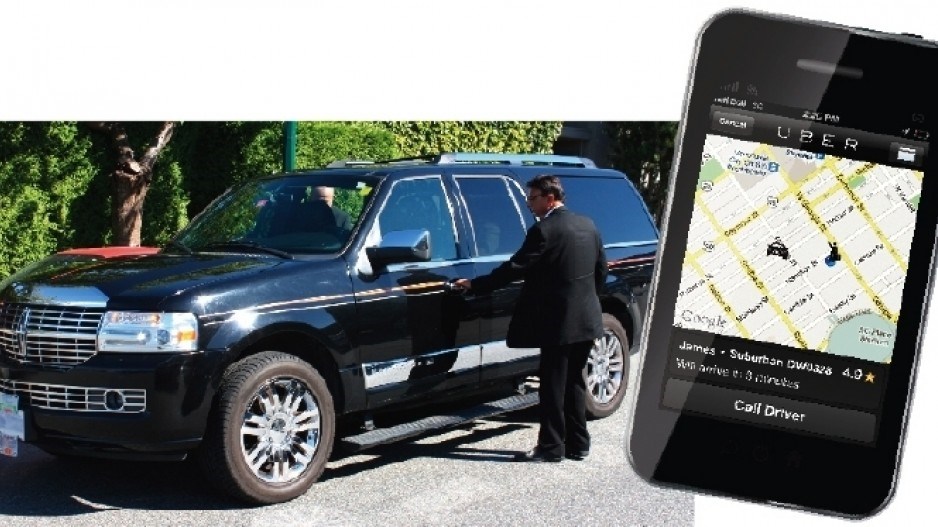One of the cooler smartphone apps to come along lately for urban dwellers – especially popular among the clubbing crowd – is Uber.
Step out of a club at midnight, tap your Uber app, and voila – a smartly dressed driver in a black sedan shows up in minutes.
You don't have to enter an address – the driver uses geolocation to find you – and no money changes hands because your credit card is automatically charged. The ride is more expensive than a cab but cheaper than a limousine.
But does Uber charge provincial and federal sales taxes? Are the drivers properly licensed and insured for carrying paying passengers? These are some of the questions the local taxi industry and Passenger Transportation Branch are asking.
"It is an app that is unregulated," said Carolyn Bauer, general manager for the Vancouver Taxi Association.
The San Francisco-based company, which has been slowly expanding across North America and Europe and has plans for Asia, recently made a soft entry in Vancouver.
The Taxicab, Limousine and Paratransit Association (TLPA) in the U.S. has branded driver apps like Lyft and Uber "rogue apps" that link users to "self-certified drivers," and it warns there could be risks to the public.
"The technology is fantastic," said TLPA spokesman John Boit. "TLPA wants to be clear that they love the technology. They want this technology to be out there because customers will love it. It comes down to a regulatory question."
Uber co-founder and CEO Travis Kalanick said Uber is getting resistance in the cities it enters because it poses a threat to the existing taxi and limo industry.
"We're going in and we're offering new technology that's changing the business landscape, and the folks who are tied to the old system, they don't build their business on technology and innovation," Kalanick told Business in Vancouver. "They're worried."
Bauer's association shares the TLPA's concerns about Uber, which appears to operate in a regulatory grey area.
The City of Vancouver requires all limousine drivers in the city to obtain a vehicles-for-hire licence, a safety inspection from the Ministry of Transportation and Infrastructure, a general inspection by the city, a passenger transportation licence, a chauffer's permit from the Vancouver police, a class 4 driver's licence and a full police background check.
The two drivers that BIV spoke to were both part-time, working to suit their own hours around other jobs and businesses. They told BIV that they provide their own cars and pay for all the maintenance, insurance and gas themselves. One said that they cannot even call or text Uber with any questions – just like the customers, their only contact is by email or via the app on the iPhone on their dashboard – which drivers also provide themselves.
However, both were unreservedly excited about being part of the Uber service, and one expected to start driving full-time soon as business grows. "Uber is the future," he said.
Enthusiasm for the job aside, it's not clear whether Uber drivers operating in Vancouver have any of the required driver-for-hire credentials. A spokesperson from Vancouver city hall confirmed the city has not received any applications for permits from Uber drivers.
Kalanick said, "We work with licensed regulated drivers that are insured, that follow the regulatory specifications to a T.
"These are not just random people. These are people whose profession is to be limousine drivers. We only work with certified drivers.
"All we're doing is connecting existing limo companies and drivers with people who want their services."
Dawn Major, director and registrar for the Passenger Transportation Branch, said she has been playing phone tag with Uber's legal counsel, trying to find out exactly who the drivers are and determine whether they require certification.
"I would love nothing better than for this to be able to work, because I think it's a fabulous app," Major said. "It's a great app. But they need to play by the rules."
Major said the branch shares concerns about the possibility of Uber drivers without proper credentials.
"They're in a vacuum at this point," she said.
Bauer asked if either Uber or the drivers collect federal and provincial sales taxes.
Asked if all sales taxes are collected, Kalanick said, "I think all appropriate taxes are collected and paid," but wasn't sure if an Uber user would see it on a receipt. BIV's own journey receipts did not show tax payments.
Bauer also alleged the rates Uber charges are not legal in this province. Rates are set by the Passenger Transportation Board, and the rates Uber charges are higher than the amount taxis in B.C. charge and lower than limo charges.
Kalanick said established limo companies don't charge the regulated rates either.
"The laws are not enforced," he said. "Nobody follows those laws."




